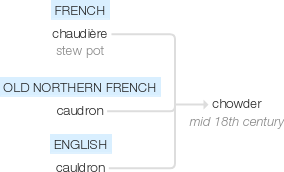Chowder
mid 18th century: perhaps from French chaudière ‘stew pot’, related to Old Northern French caudron (see cauldron).
wiktionary
Probably borrowed from French chaudière(“pot”), from Late Latin caldaria, from Latin caldarium. Related to English cauldron.
Possibly from older English jowter(“fish monger”).
etymonline
chowder (n.)
"thick fish soup," 1751, American English, apparently named for the pot it was cooked in: French chaudière "a pot" (12c.), from Late Latin caldaria "cooking pot" (source of Spanish calderon, Italian calderone), from Latin calidarium "hot bath," from calidus "warm, hot" (from PIE root *kele- (1) "warm").
The word and the practice were introduced in Newfoundland by Breton fishermen and spread from there to the Maritimes and New England.
CHOWDER. A favorite dish in New England, made of fish, pork, onions, and biscuit stewed together. Cider and champagne are sometimes added. Pic-nic parties to the sea-shore generally have a dish of chowder, prepared by themselves in some grove near the beach, from fish caught at the same time. [John Russell Bartlett, "Dictionary of Americanisms," 1859]
The modern form of it usually features clams. In New England, usually made with milk; the Manhattan version is made with tomatoes. The derogatory chowderhead (1819) is a corruption of cholter-head (16c.), from jolt-head, which is of unknown origin.
